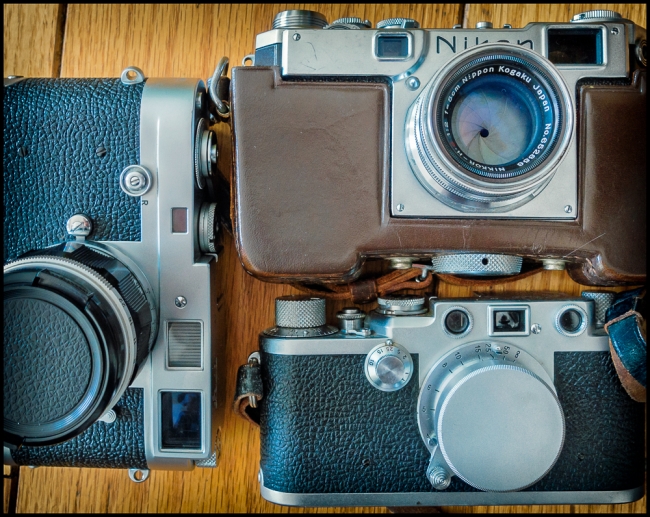I recently came across this useful post on 35mmc: What is a rangefinder camera, and is one right for you?. It does a terrific job of explaining the advantages and disadvantages of rangefinder cameras.
I have an emotional attachment to rangefinder cameras. My first serious camera was a rangefinder. It was given to me by my wife early in our relationship and I used it for many years. When I started to collect cameras it was an easy decision to start with rangefinders. I’m also a big fan of Henri Cartier-Bresson and perhaps subconsciously could see myself as the almost invisible photographer flitting around taking pictures of all and sundry (if you haven’t seen Cartier-Bresson at work see: Henri Cartier-Bresson Documentary: Pen, Brush and Camera).
The problem is that I just don’t take that kind of picture. I rarely take pictures of people and my usual subjects (buildings, objects, still life, landscapes etc.) are pretty static. So the usual benefits of rangefinders (small, discrete, reduced camera noise, reduced camera shake etc.) don’t seem to be too much of an advantage to my kind of photography. Also I find that as I get older it becomes more and more difficult to make out the rangefinder patch – especially with the compact non-interchangeable lens rangefinders that I favor.
But then In another post (The Viewfinder effect – and why I choose to cripple myself with an offset viewfinder) Hamish notes:
During a chat on the phone with a friend a few days later I happen to mention this difference in framing and he explains how he once had a similar realisation, by coincidence, also through shooting with a Leica. We concluded that the difference in framing comes from a completely different way that the camera is used. With an SLR the tendency is to frame with the camera to the eye; with the viewfinder. The camera shows the photographer depth of field and perfect framing. What results is a reliance on the camera, the camera almost finds the shot for the photographer by giving him or her the extra levels of information about the end result before the photo is taken
It seems to me that he has a point here. The rangefinder experience is different, but until reading this post I’ve never been able to figure out exactly how. But, at least in my case, Hamish is spot on. When I use an SLR I tend to look through the viewfinder a lot more. With a rangefinder I tend to look around with the camera down and only raise it to frame when I want to take the picture.
Hamish concludes with:
The problem is, there’s more to what makes rangefinder cameras attractive or otherwise than the more obvious pros and cons. As I talked about in the couple of paragraphs about frame lines, and indeed the couple of posts I link to, shooting a rangefinder is very different experience to shooting an SLR. For me – and actually I suspect most rangefinder camera photographers – this mostly comes down to the experience of using a camera with an offset viewfinder and frame lines. The experience of being able to see what’s just about to come into the frame verses the more accurate framing an SLR brings might seem like something quite small, but in practice there’s so much more to how this difference impacts on the process of taking a photo.

